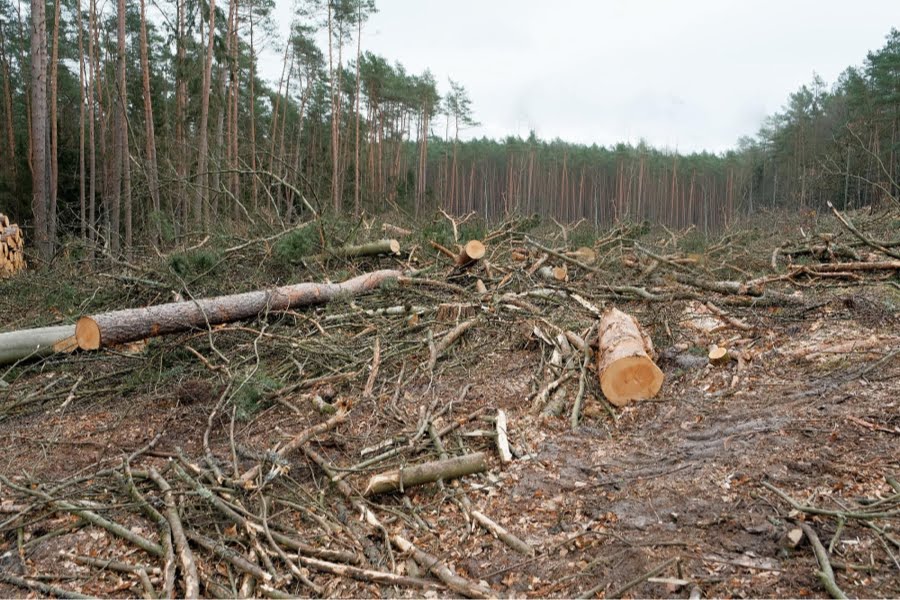Last updated on
Here’s the impact that unsustainable deforestation has on our environment. Read on!
Forests are the lifeblood of our planet, providing essential ecosystem services that support human and ecological health. As such, it is imperative that we take steps to protect forests from unsustainable practices, which can cause devastating effects on local ecosystems.
In this post, we’ll explore the possible negative consequences of unsustainable forest practices and what needs to be done in order to ensure responsible management of our global forests.
Overview of Unsustainable Forest Practices

Forests are the lungs of our planet, providing us with the oxygen we need to survive. Unfortunately, unsustainable forest practices have put a significant strain on our planet’s natural resources.
Clear-cutting, selective logging, and other unsustainable practices have resulted in deforestation and habitat destruction, leading to the loss of biodiversity, soil degradation, water pollution, and climate change.
Despite the numerous environmental consequences of these practices, some industries continue to prioritize profit over sustainability.
Unless we take immediate action to reverse these harmful practices and promote sustainable forestry, the damage done to our planet will be irreversible. It’s time to acknowledge the critical role forests play in our lives and start treating them with the respect and care they deserve.
Impact on Local Ecosystems

Unsustainable forest practices can have devastating impacts on local ecosystems. These practices, such as deforestation and over-harvesting of timber, result in the destruction of natural habitats that are home to many species of animals.
They also lead to soil erosion and degradation, reducing the availability of essential nutrients for plants. In addition, these activities can cause changes in rainfall patterns which can lead to flooding or drought in certain areas.
Furthermore, without trees or vegetation to slow down runoff from rain or melting snow, water is more likely to pick up pollutants as it flows across land surfaces into rivers and streams, resulting in degraded water quality downstream.
All these impacts threaten biodiversity and put human life at risk; thus it is important that we take action now to protect our planet’s precious resources for future generations.
Deforestation and Carbon Emissions

Deforestation is a critical issue that leads to several ecological problems, including carbon emissions. Trees are crucial in the fight against climate change as they absorb carbon dioxide and store carbon in their biomass.
However, deforestation disrupts this process by cutting down trees and releasing stored carbon back into the atmosphere. This act not only reduces the number of trees but also contributes directly to the increase in carbon emissions, thus accelerating climate change.
An important resource for those looking to responsibly manage forests is https://oregonforestsforever.com/professional-forest-management/, as it provides information on the best practices for preserving and protecting our global forests. We must take action to combat deforestation to protect our planet’s natural resources and ensure a habitable environment for future generations.
The Decline in Animal Habitats and Biodiversity

Removing trees causes changes in rainfall patterns which can lead to flooding or drought in some areas. It also leads to soil erosion which reduces essential minerals for plants and organic matter that make up healthy soils.
Furthermore, deforestation can cause water pollution by allowing pollutants from rain or melting snow to flow unchecked into rivers and streams downstream. We must take action now to protect our planet’s incredible diversity of life before it is too late.
Impacts on Water Quality and Soil Nutrients

Deforestation has significant and far-reaching impacts on water quality and soil nutrients. When trees are removed, the natural cycle of evaporation, condensation, and precipitation is disrupted, leading to changes in rainfall patterns.
This can cause flooding in some areas while leaving other areas dryer than before. Deforestation also leads to soil erosion which affects the availability of essential minerals for plants and reduces the amount of organic matter that makes up healthy soils.
In addition, without trees or vegetation to slow down runoff from rain or melting snow, water is more likely to pick up pollutants as it flows across land surfaces into rivers and streams.
As a result, deforestation not only threatens biodiversity but can lead to degraded water quality which affects humans downstream who rely on clean drinking water for their daily needs.
Effects on Local Climate Change
By cutting down trees and reducing natural habitats, deforestation disrupts the balance of our planet’s delicate ecosystems and contributes to global warming. The loss of vegetation reduces carbon dioxide absorption while releasing stored carbon into the atmosphere, thus accelerating climate change.
Additionally, deforestation can also lead to soil erosion and changes in surface temperature that can affect weather patterns such as rainfall distribution, drought intensity, and extreme temperatures. It’s essential for us to take action to combat deforestation if we want to protect our planet from these devastating effects.
It is becoming increasingly evident that unsustainable logging and forest practices have far-reaching implications, both locally and globally. To combat this we must take immediate proactive steps to enhance protection efforts in forests around the world.
These include investing more funds into control systems; developing renewable energy solutions to replace current unsustainable practices; and continuing research into new innovative changes which can safely address concerns surrounding our forests’ future.
These combined steps could be important in restoring our vital ecosystems – so action needs to be taken now before it is too late.
Related reading:
Table of Contents





